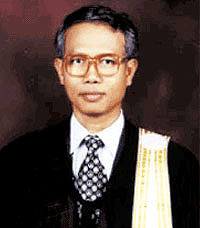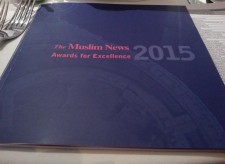By Max Constant
BANGKOK (AA) – Twelve years after her husband was forced into a waiting car, never to be seen again, a newly elected Muslim member of Thailand’s human rights commission says she has made the fight against such enforced disappearances a priority.
“A law on enforced disappearance has been drafted two years ago, and is now waiting cabinet approval,” Angkhana Neelapaijitr, told Anadolu Agency on Monday.
“One of my major concerns is that the action committee set up by this law would be composed of government officers, including military members. We don’t yet know if this committee will be independent.”
With Thailand’s police and military suspected of being responsible for many of the country’s forced disappearances, one can understand her fears.
Especially when the last people to see husband Somchai Neelapaijitr — the then chairman of the Muslim Lawyers Association of Thailand — alive were police officers.
According to Human Rights Watch (HRW), on March 12, 2004, five officers pulled Somchai from his car in Bangkok.
At the time, he was directing a high-profile lawsuit alleging widespread police torture of Muslim suspects in Thailand’s insurgency-ridden southern border provinces.
It is widely presumed that he was murdered, but his body has never been recovered.
Brad Adams, HRW Asia director, has claimed that six successive Thai prime ministers have admitted government involvement in Somchai’s disappearance and pledged action, but with little result.
“This case will hang over the heads of future prime ministers until the perpetrators are held to account,” Adams said in a March 2014 statement.
The new law Neelapaijitr is championing finally allows relatives to act as plaintiffs — significant progress to victims such as her.
Just last month, the Thai Supreme Court ruled that the 59-year-old Bangkok Muslim could not act on behalf of her disappeared husband because there was no actual evidence he was dead or even seriously injured.
The judges also dismissed all abduction charges against the five policemen seen forcing Somchai into the vehicle.
“I was really disappointed,” she told Anadolu Agency. “The judges only read the law from the book, but they were not interested in the facts.”
Although the five officers have been charged with coercion and robbery in relation to Somchai’s case, none have been charged with the more serious crime of abduction.
In 2004, the Central Criminal Court in Bangkok found one of the men — a Police Major Ngern Tongsuk — guilty of physically assaulting Somchai and sentenced him to three years of imprisonment, but the other four were acquitted due to insufficient evidence.
The judge, however, did conclude that the assault led to Somchai’s “disappearance” and criticized the efforts of the police in investigating the case.
HRW has underlined that even though the telephone records of the police officers showed that they were in contact with one another in the days leading up to the abduction and in the vicinity of the scene of the crime, the court ruled that they were not admissible, because they were not original or certified copies of the records.
But the appeal court overruled this verdict in 2011 and acquitted all five defendants for “lack of evidence”, a decision upheld by the Supreme Court last December.
On Monday, Neelapaijitr emphasized that it was clear to many observers in the court — including the Geneva-based International Commission of Jurists — that the main female witness in the case was so scared of those accused that she could not even look at them.
“She did not dare even turn her face towards them,” says Neelapaijitr, who has herself been placed under a witness protection program because of the threats she has received in relation to the case.
Neelapaijitr’s new post — she was elected in November — places her in charge of civil rights for the seven-member commission, in which she is the sole Muslim.
She says she sees this as a dominant issue in the country, which has been ruled since the May 2014 coup by a military junta — particularly the constraints put by the military regime on freedom of expression.
“It is a priority. Now, people can be arrested and sent to military court only for using their right to express their opinion,” she said in a soft, almost fragile voice.
“We have to respect the right of people who think differently,” she adds.
Following her husband’s disappearance, Neelapaijitr founded the NGO Working Group on Justice for Peace, which has a focus on helping the victims of violence in the Thai south.
The three southernmost provinces — where 80 percent of the population is Malay Muslim — have been plagued by an insurgency against the central state for decades.
Following a quiet spell, fighting re-emerged in 2004, killing some 6,500 people and injuring 11,000 others. To combat the insurgency, a 60,000 military force has been placed in the provinces of Yala, Pattani and Narathiwat and several districts of Songkhla — which many human rights groups see as inflaming, not solving, the issue.
With shootings and bomb attacks continuing, the military has committed a wide range of well-documented abuses, among them arbitrary detentions — Neelapaijitr’s major concern.
“Security officers arrest people and don’t even tell their families where they are detained,” she told Anadolu Agency. “The state officers should respect the law, and allow lawyers and relatives to visit them.”
Torture during detention, an issue underscored in a Thai NGO report earlier this month, is also a regular occurrence according to detainee accounts.
Neelapaijitr says that the fight against such mistreatment is a battle of its own.
“The scars and physical evidence are often not visible,” she says, adding that that leaves the torture difficult to prove.
“Most of the detainees have said they were subjected to cold torture [which doesn’t scar], such as plastic bags being put over their heads or the detainees held under water.”
As a “committed Muslim”, Neelapaijitr — whose grandmother was a Buddhist who converted to Islam — says her religion plays a large role in shaping her approach to life.
“According to Islam, everything that happens is according to Allah’s will. We cannot choose. Some of my colleagues said I was chosen by Allah to be a victim, and then to be a NGO leader. And even now, it seems that I cannot choose,” she underlines.
“We just have to do our best on this Earth and get the benefits after.”
[Photo: Somchai Neelapaijit, Human Rights lawyer disappeared on 12 March 2004. Photographer: Desaparecdos]

















